Abstract
This article describes a research program to develop an operant treatment for cocaine addiction in low-income, treatment-resistant methadone patients. The treatment's central feature is an abstinence reinforcement contingency in which patients earn monetary reinforcement for providing cocaine-free urine samples. Success and failure of this contingency appear to be an orderly function of familiar parameters of operant conditioning. Increasing reinforcement magnitude and duration can increase effectiveness, and sustaining the contingency can prevent relapse. Initial development of a potentially practical application of this technology suggests that it may be possible to integrate abstinence reinforcement into employment settings using salary for work to reinforce drug abstinence. This research illustrates the potential utility and current limitations of an operant approach to the treatment of drug addiction. Similar research programs are needed to explore the limits of the operant approach and to develop practical applications that can be used widely in society for the treatment of drug addiction.
Keywords: operant conditioning, reinforcement, contingency management, drug addiction, drug abuse, treatment
Full text
PDF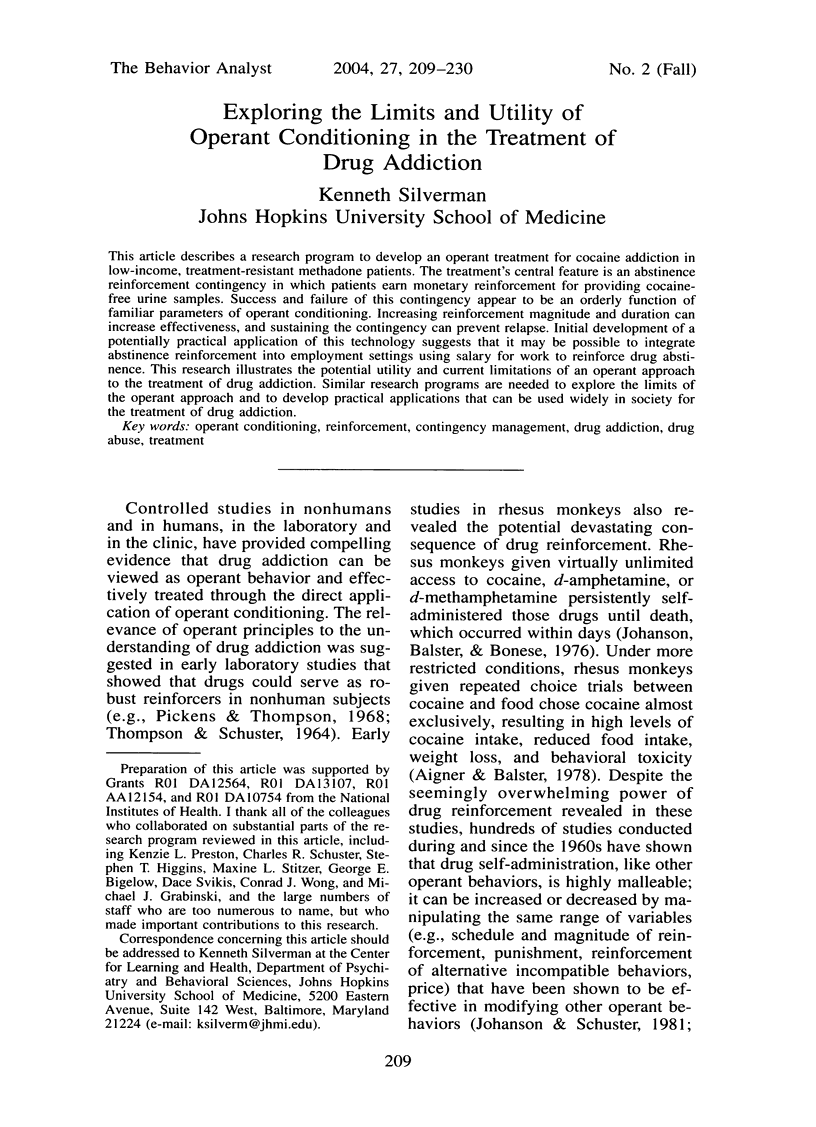
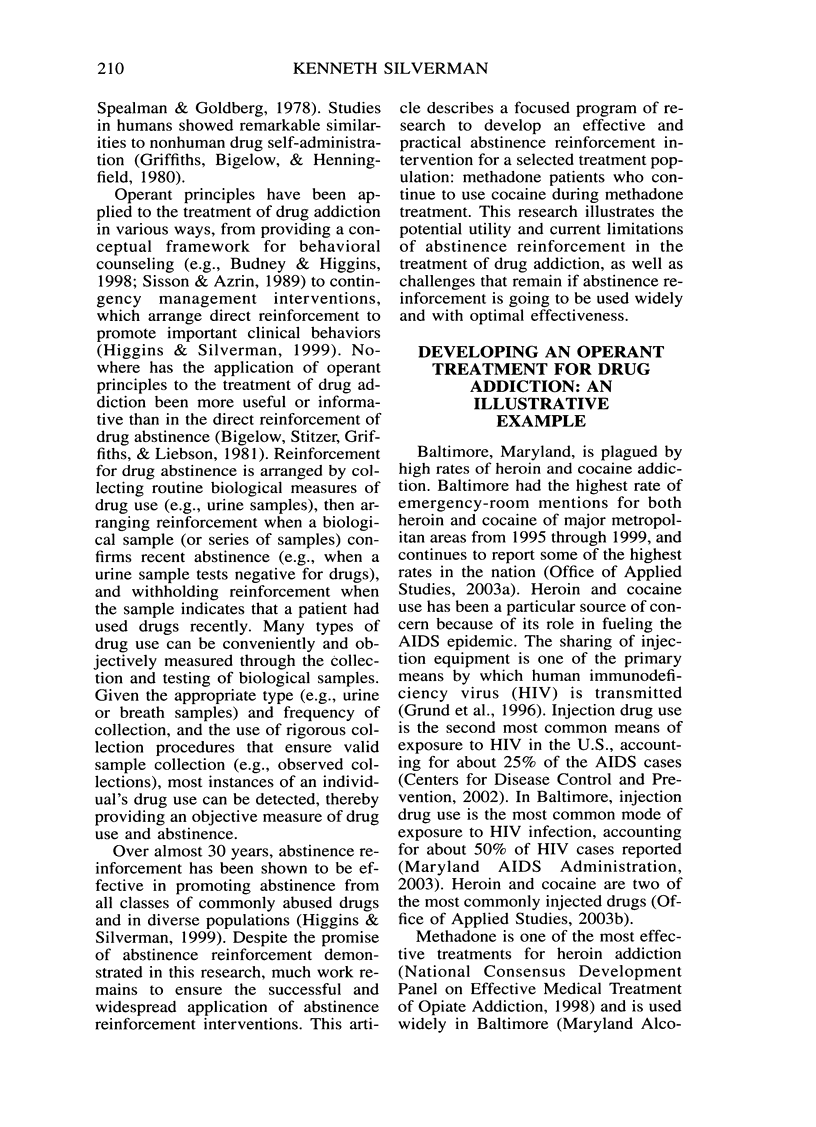

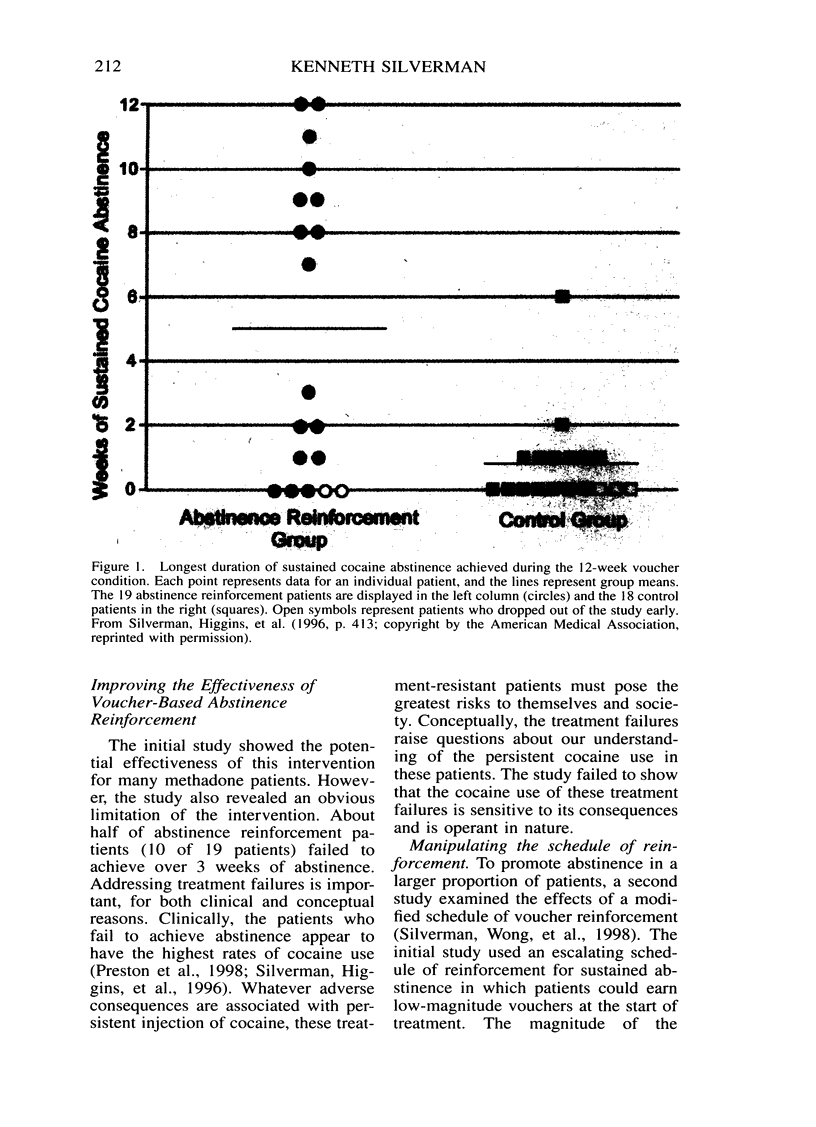

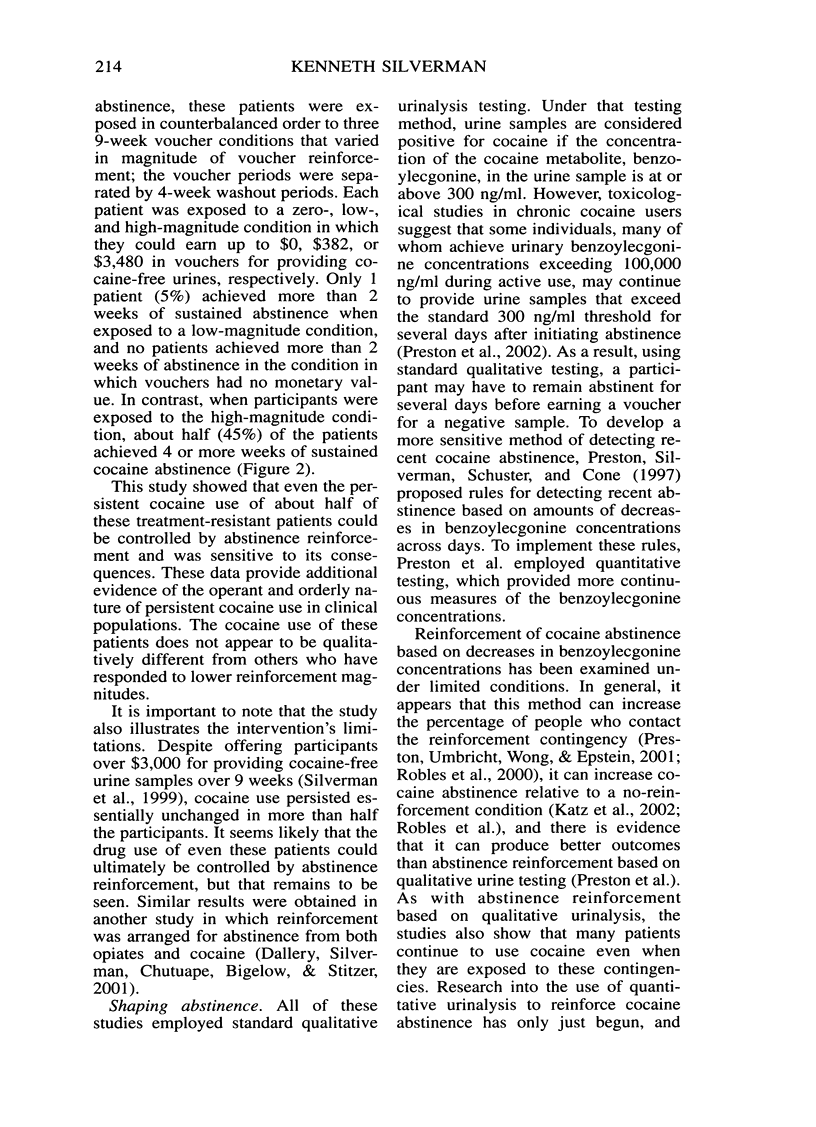
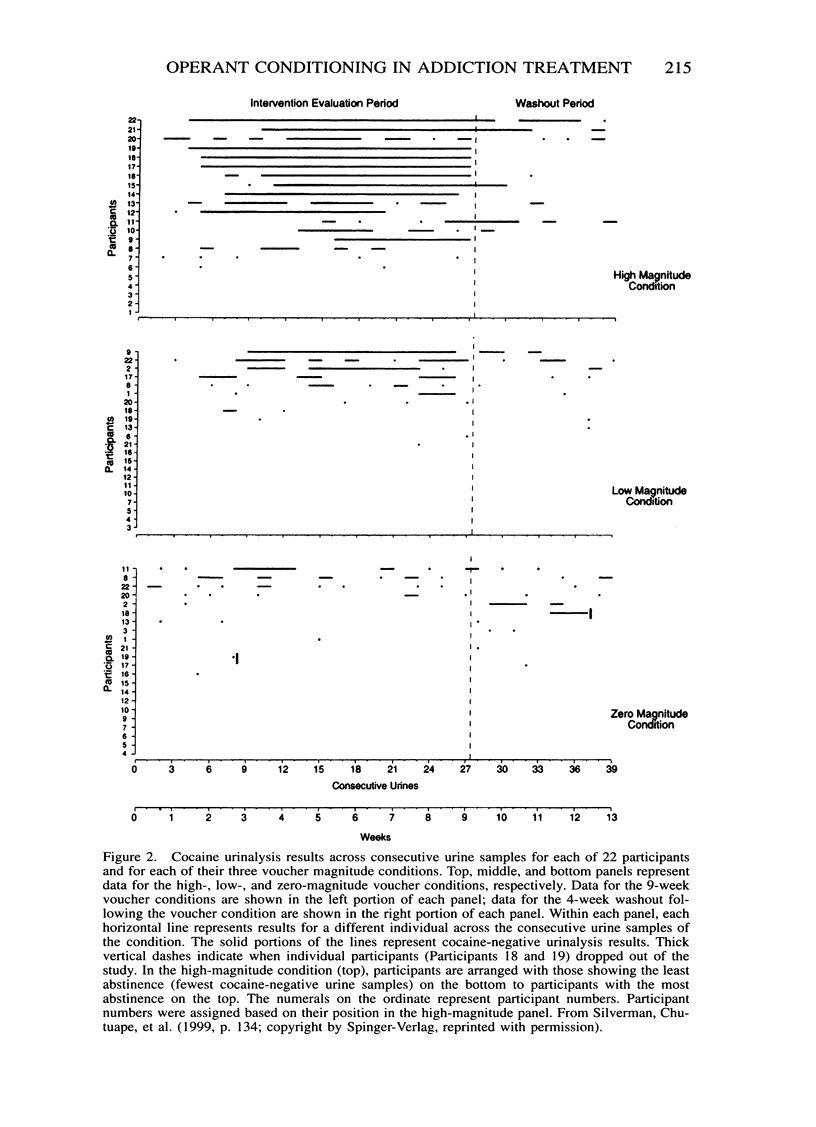
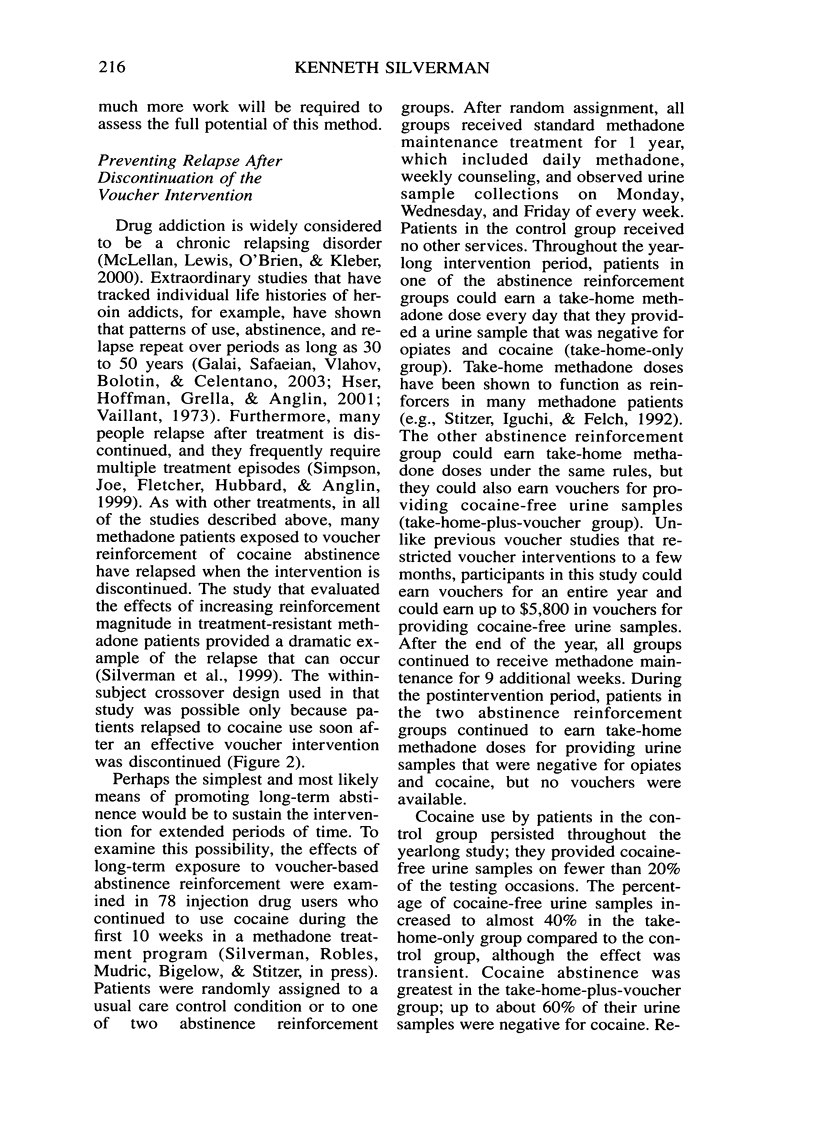
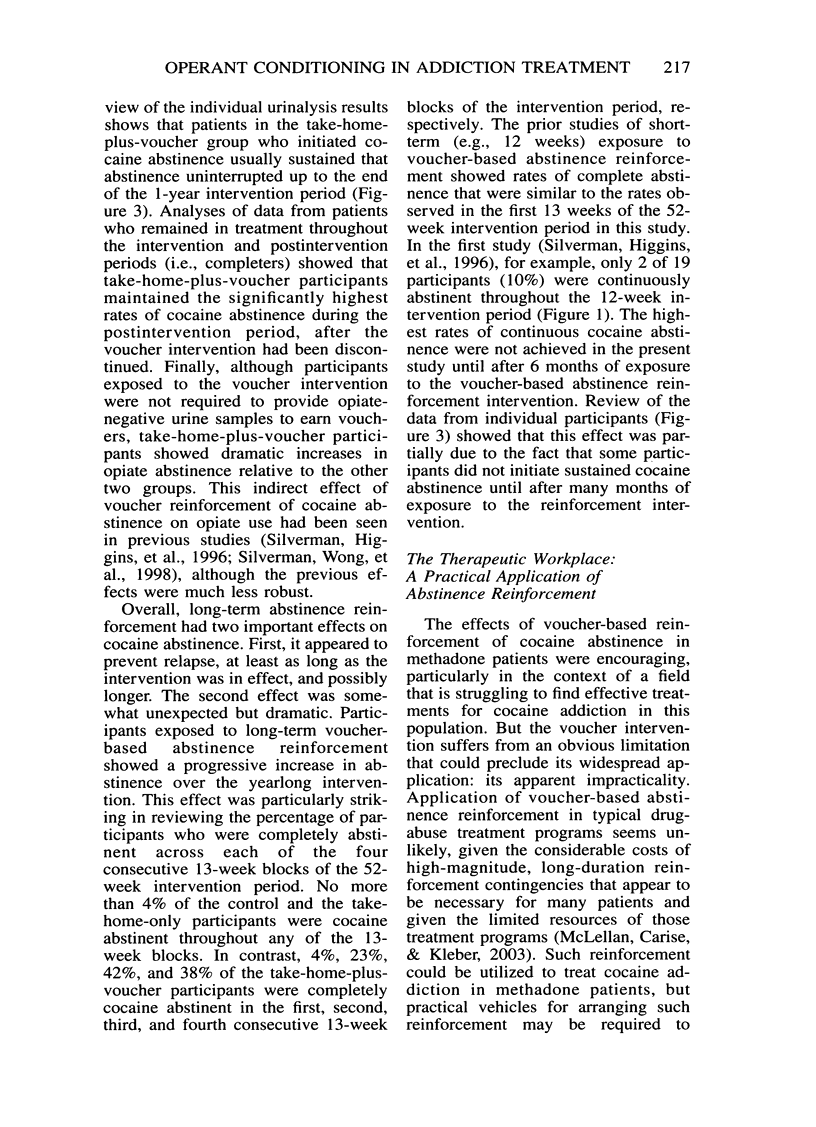
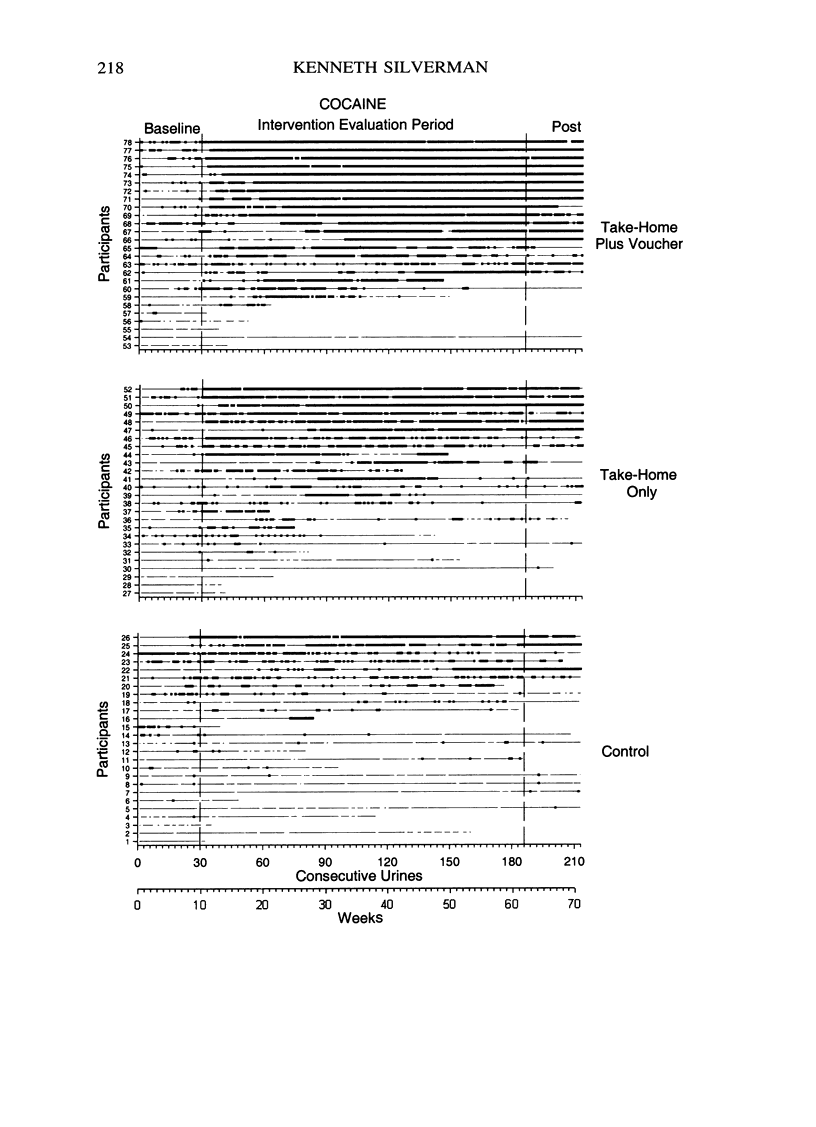
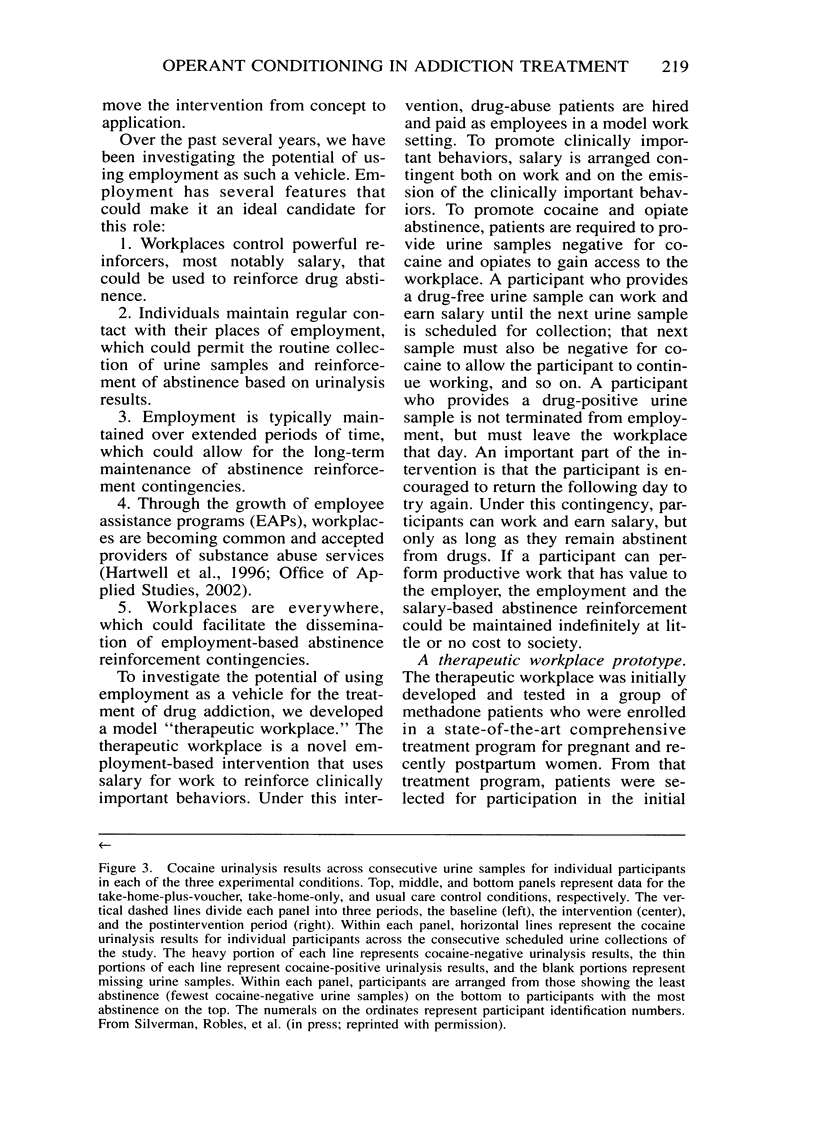
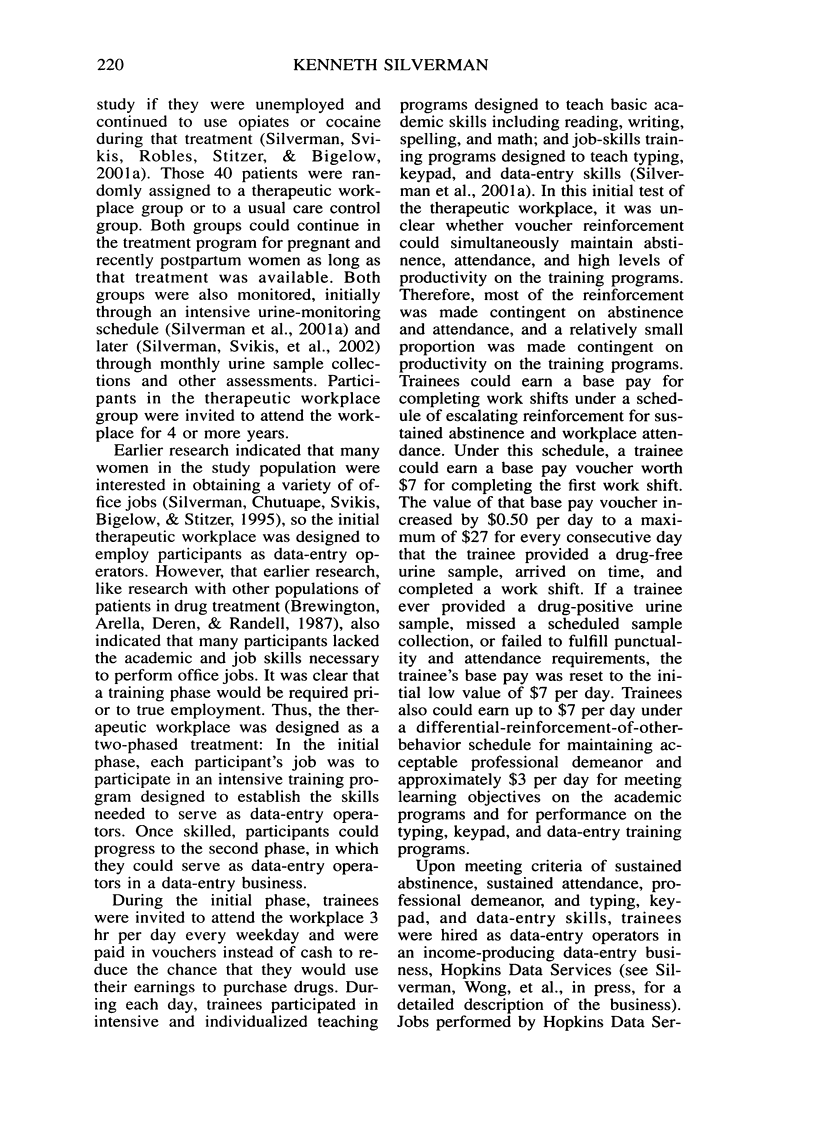
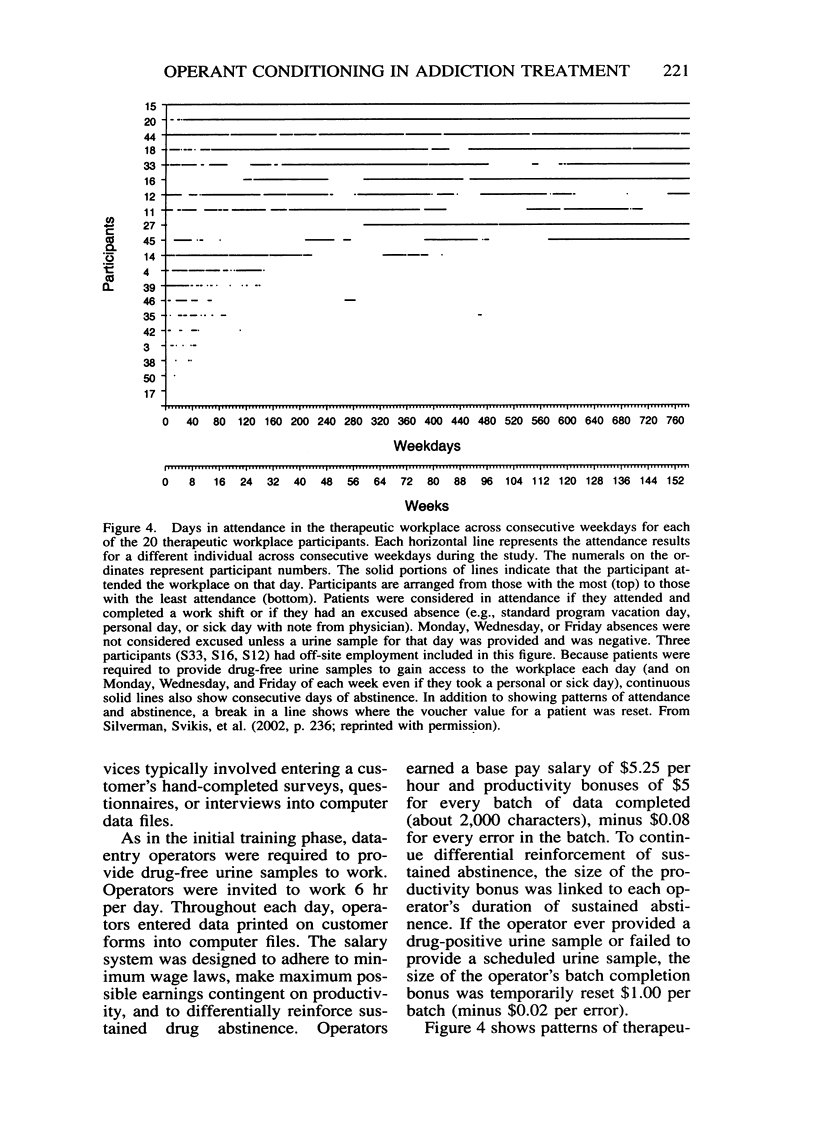
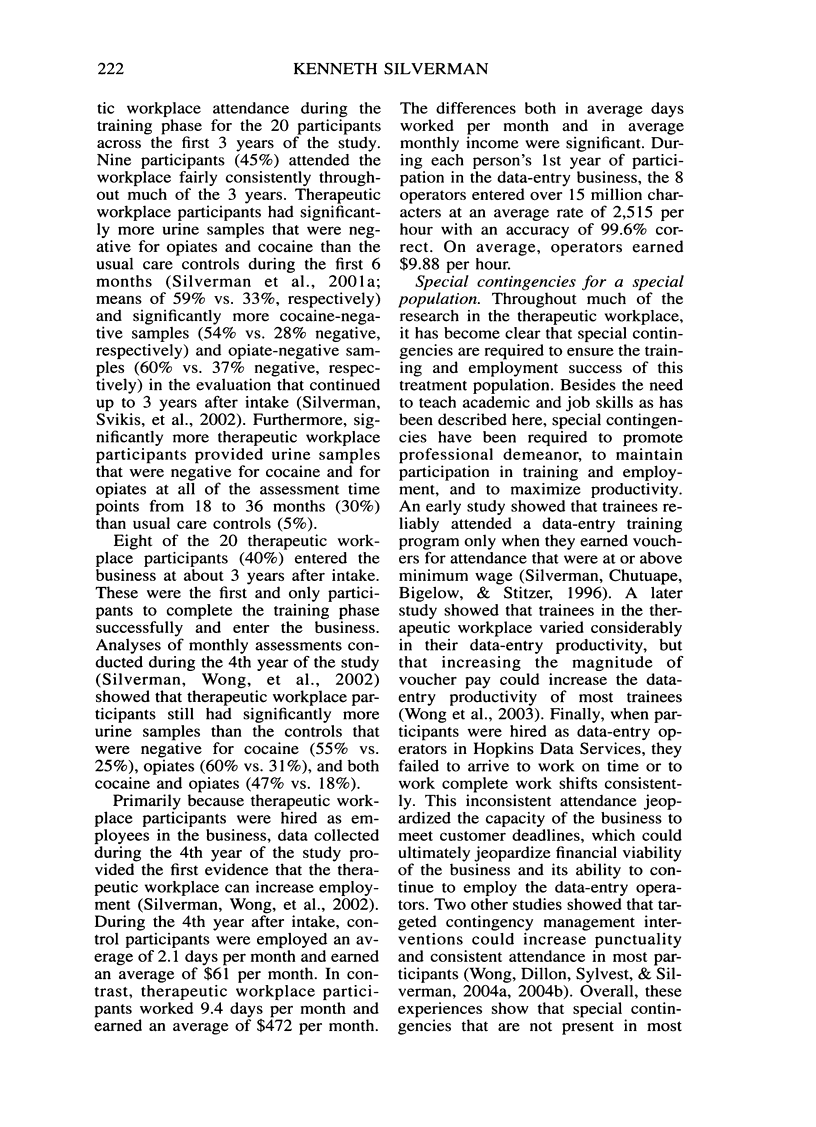
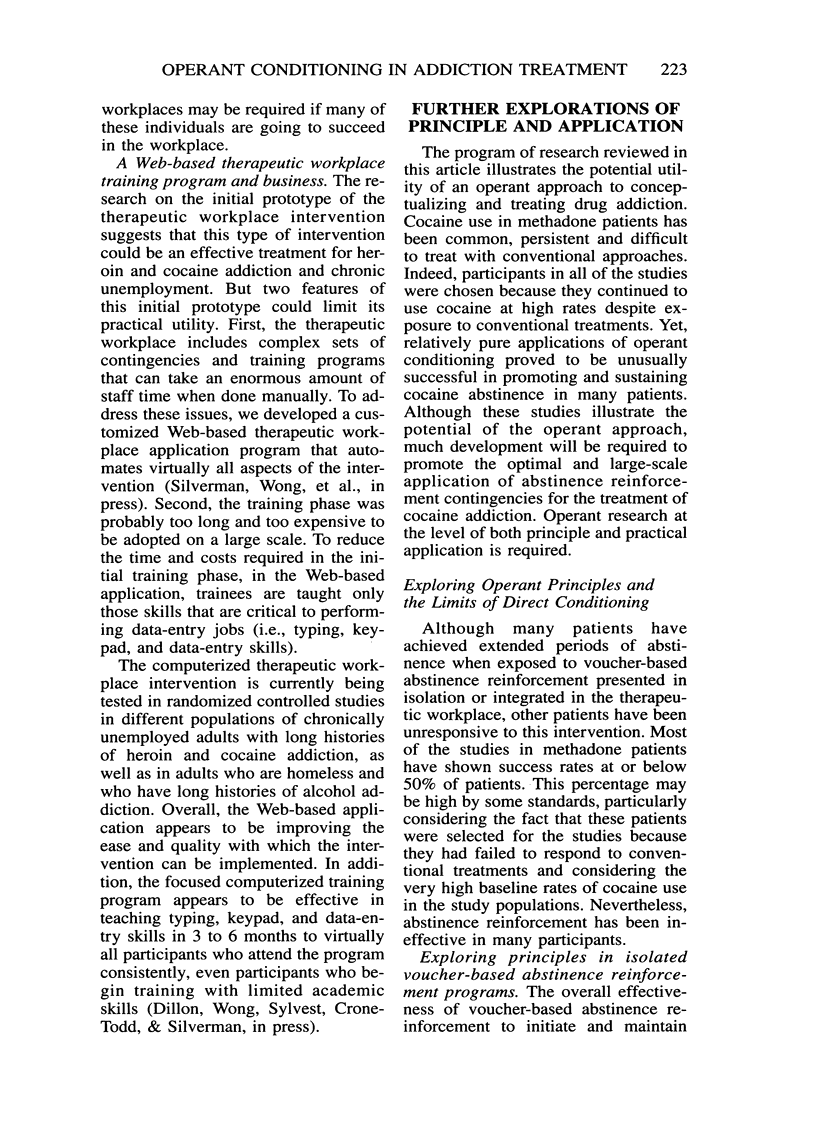
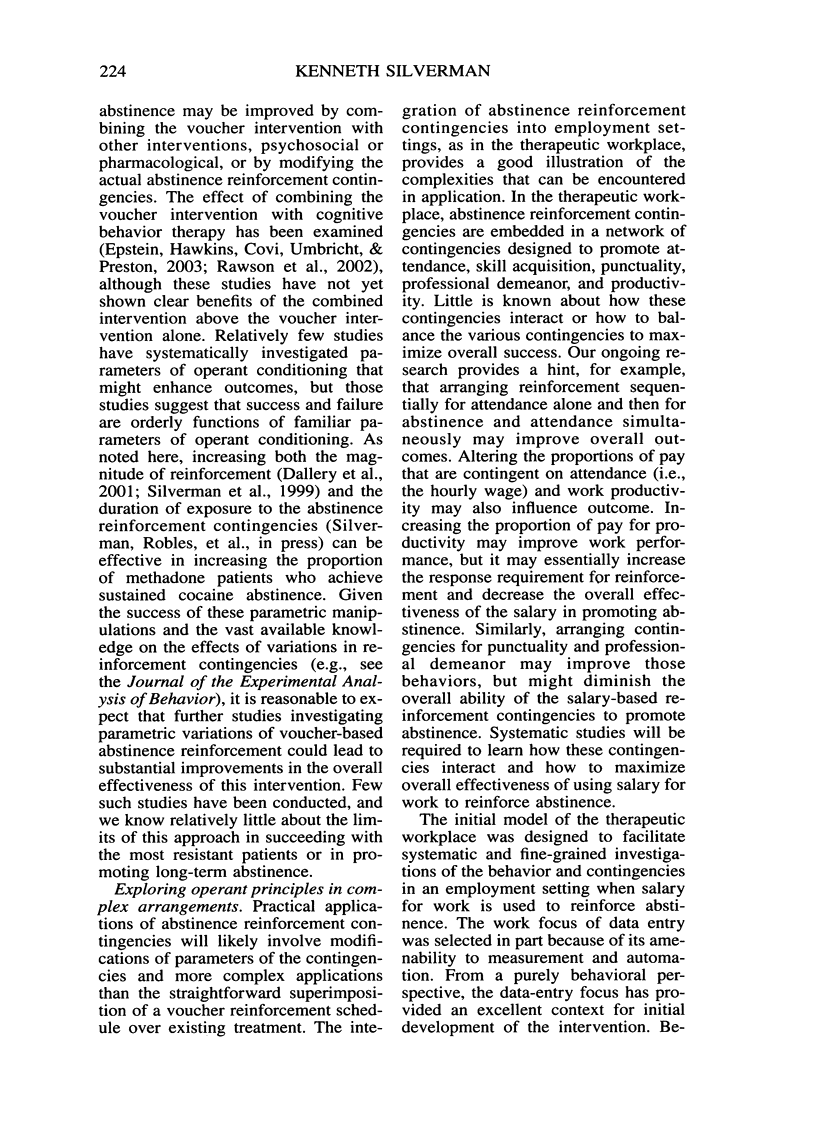
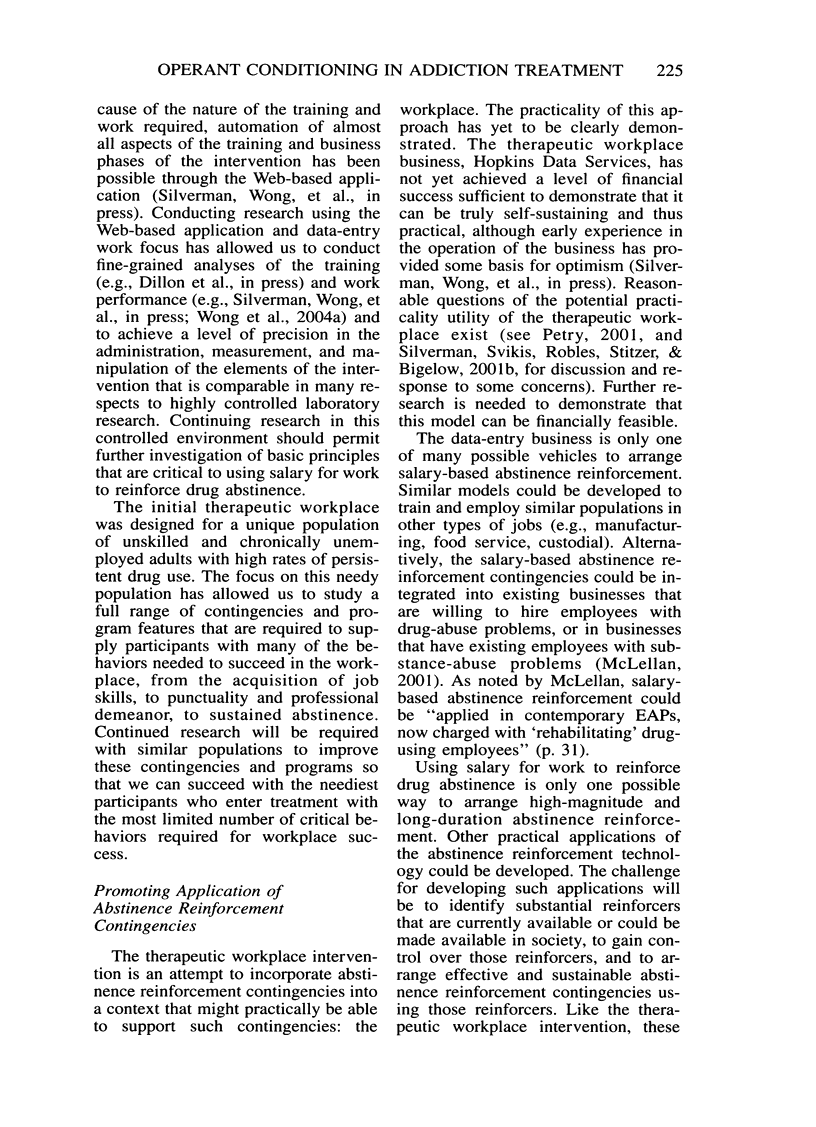
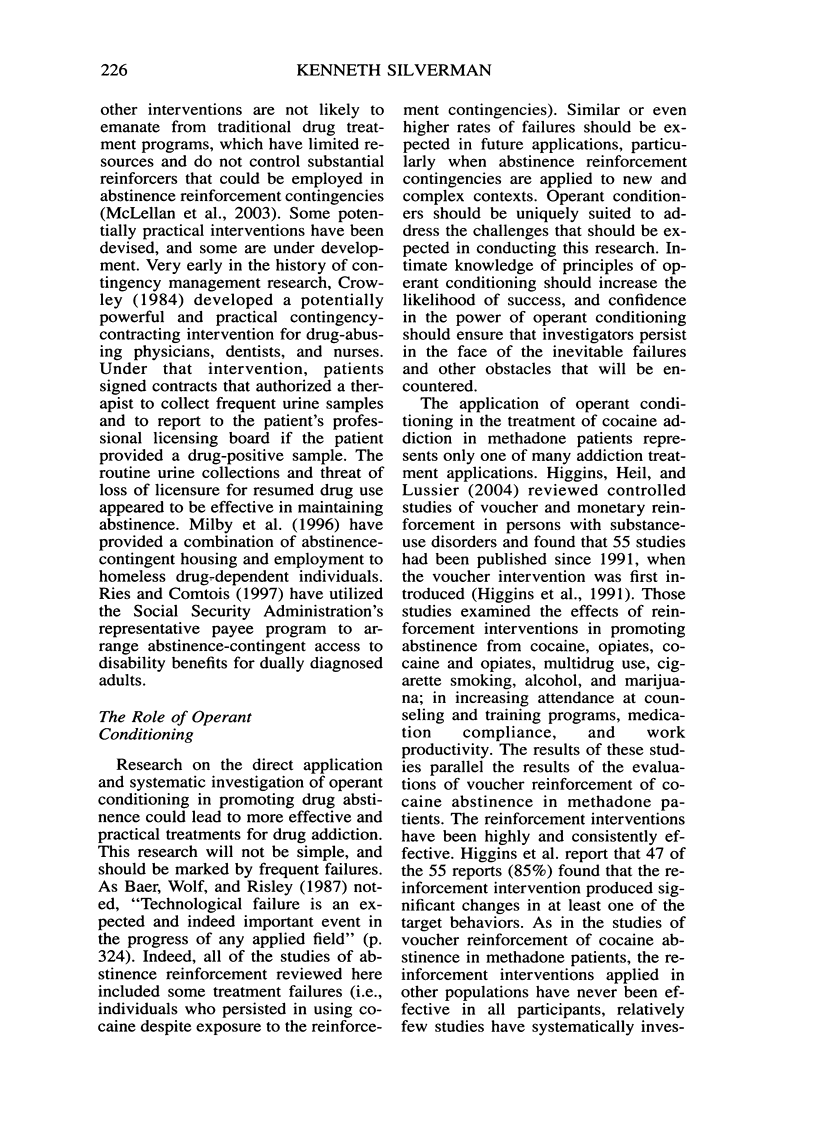
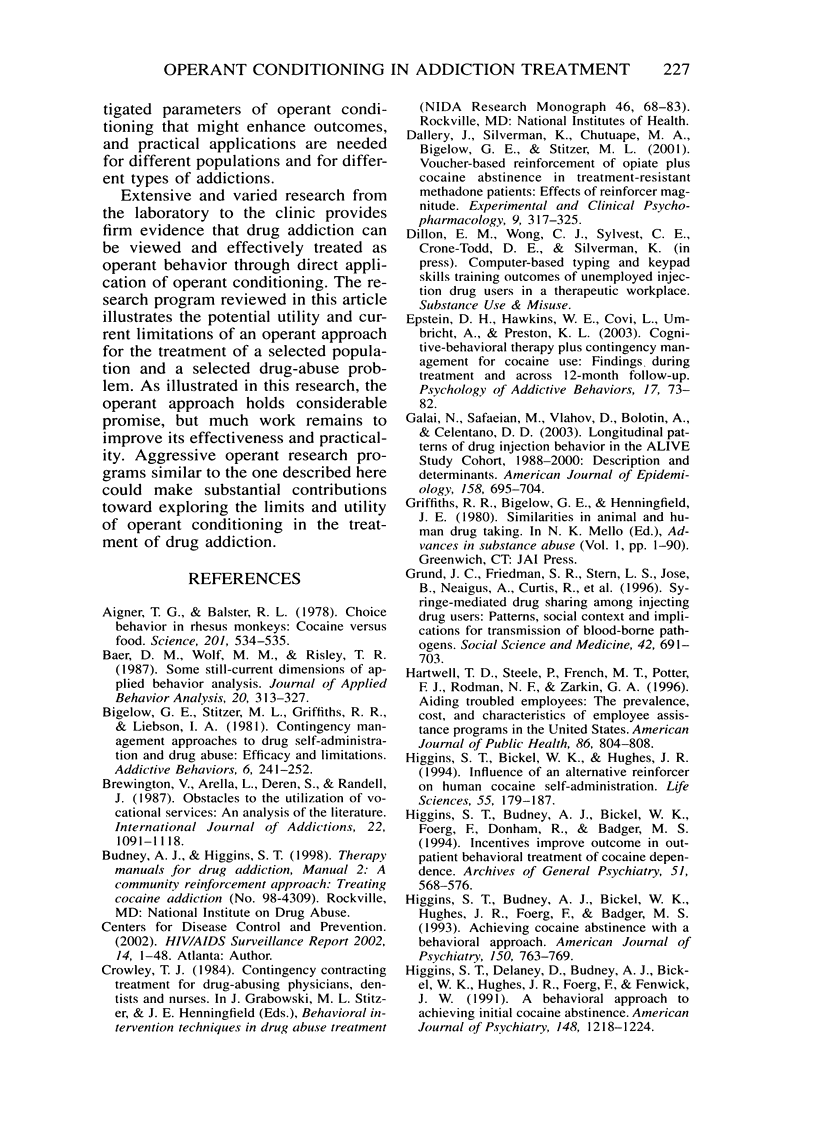
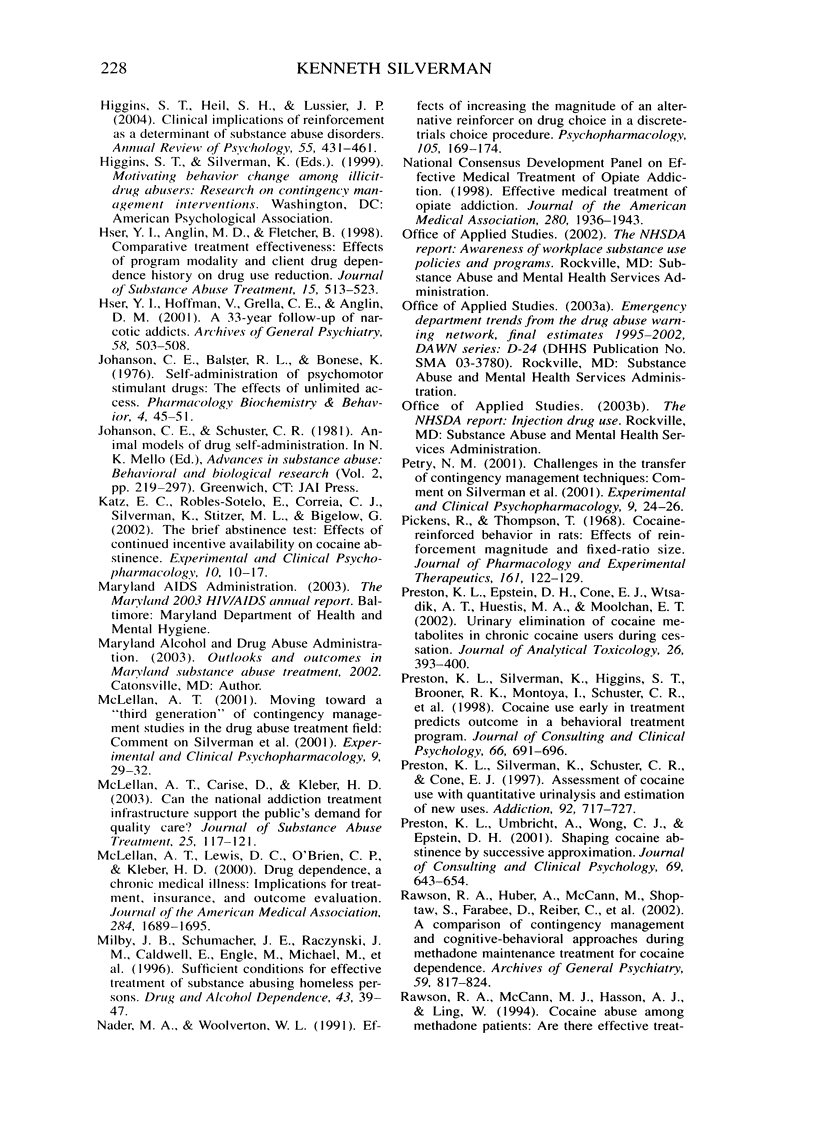
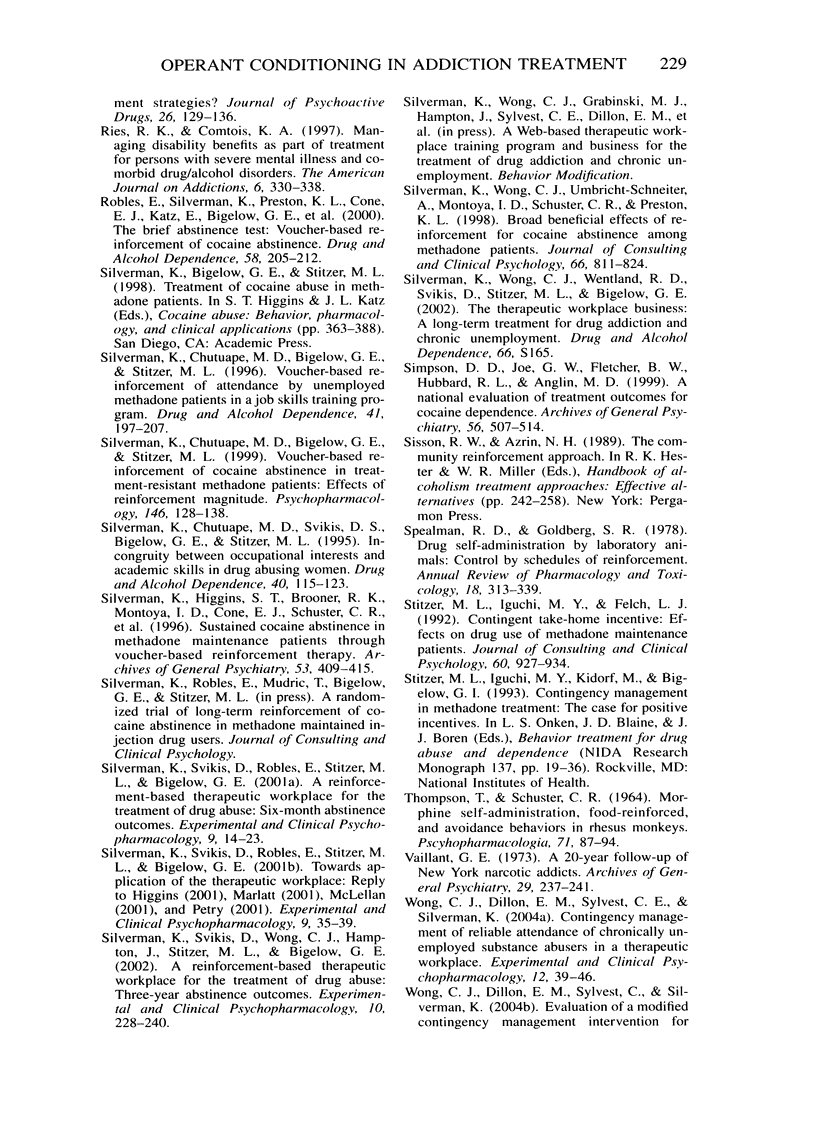
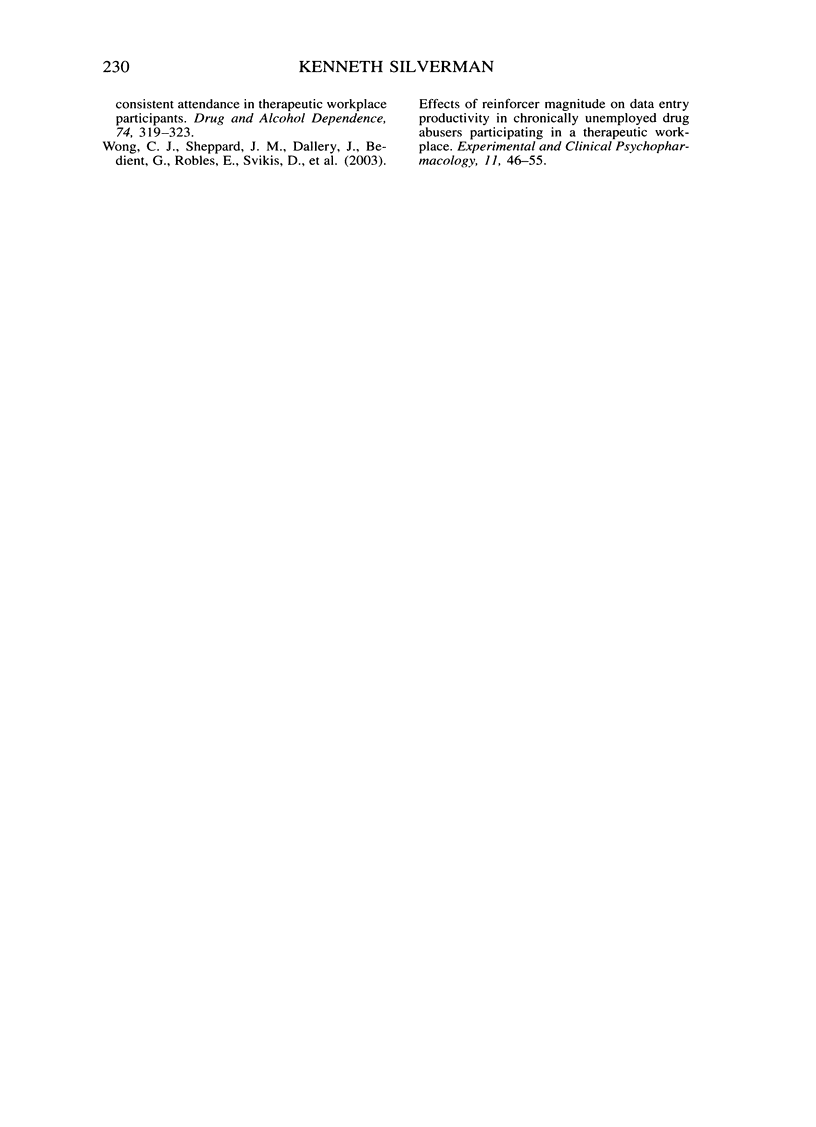
Selected References
These references are in PubMed. This may not be the complete list of references from this article.
- Aigner T. G., Balster R. L. Choice behavior in rhesus monkeys: cocaine versus food. Science. 1978 Aug 11;201(4355):534–535. doi: 10.1126/science.96531. [DOI] [PubMed] [Google Scholar]
- Baer D. M., Wolf M. M. Some still-current dimensions of applied behavior analysis. J Appl Behav Anal. 1987 Winter;20(4):313–327. doi: 10.1901/jaba.1987.20-313. [DOI] [PMC free article] [PubMed] [Google Scholar]
- Bigelow G. E., Stitzer M. L., Griffiths R. R., Liebson I. A. Contingency management approaches to drug self-administration and drug abuse: efficacy and limitations. Addict Behav. 1981;6(3):241–252. doi: 10.1016/0306-4603(81)90022-8. [DOI] [PubMed] [Google Scholar]
- Brewington V., Arella L., Deren S., Randell J. Obstacles to the utilization of vocational services: an analysis of the literature. Int J Addict. 1987 Nov;22(11):1091–1118. doi: 10.3109/10826088709027472. [DOI] [PubMed] [Google Scholar]
- Dallery J., Silverman K., Chutuape M. A., Bigelow G. E., Stitzer M. L. Voucher-based reinforcement of opiate plus cocaine abstinence in treatment-resistant methadone patients: effects of reinforcer magnitude. Exp Clin Psychopharmacol. 2001 Aug;9(3):317–325. doi: 10.1037//1064-1297.9.3.317. [DOI] [PubMed] [Google Scholar]
- Epstein David H., Hawkins Wesley E., Covi Lino, Umbricht Annie, Preston Kenzie L. Cognitive-behavioral therapy plus contingency management for cocaine use: findings during treatment and across 12-month follow-up. Psychol Addict Behav. 2003 Mar;17(1):73–82. doi: 10.1037/0893-164X.17.1.73. [DOI] [PMC free article] [PubMed] [Google Scholar]
- Galai N., Safaeian M., Vlahov D., Bolotin A., Celentano D. D., ALIVE Study Longitudinal patterns of drug injection behavior in the ALIVE Study cohort,1988-2000: description and determinants. Am J Epidemiol. 2003 Oct 1;158(7):695–704. doi: 10.1093/aje/kwg209. [DOI] [PubMed] [Google Scholar]
- Grund J. P., Friedman S. R., Stern L. S., Jose B., Neaigus A., Curtis R., Des Jarlais D. C. Syringe-mediated drug sharing among injecting drug users: patterns, social context and implications for transmission of blood-borne pathogens. Soc Sci Med. 1996 Mar;42(5):691–703. doi: 10.1016/0277-9536(95)00193-x. [DOI] [PubMed] [Google Scholar]
- Hartwell T. D., Steele P., French M. T., Potter F. J., Rodman N. F., Zarkin G. A. Aiding troubled employees: the prevalence, cost, and characteristics of employee assistance programs in the United States. Am J Public Health. 1996 Jun;86(6):804–808. doi: 10.2105/ajph.86.6.804. [DOI] [PMC free article] [PubMed] [Google Scholar]
- Higgins S. T., Bickel W. K., Hughes J. R. Influence of an alternative reinforcer on human cocaine self-administration. Life Sci. 1994;55(3):179–187. doi: 10.1016/0024-3205(94)00878-7. [DOI] [PubMed] [Google Scholar]
- Higgins S. T., Budney A. J., Bickel W. K., Foerg F. E., Donham R., Badger G. J. Incentives improve outcome in outpatient behavioral treatment of cocaine dependence. Arch Gen Psychiatry. 1994 Jul;51(7):568–576. doi: 10.1001/archpsyc.1994.03950070060011. [DOI] [PubMed] [Google Scholar]
- Higgins S. T., Budney A. J., Bickel W. K., Hughes J. R., Foerg F., Badger G. Achieving cocaine abstinence with a behavioral approach. Am J Psychiatry. 1993 May;150(5):763–769. doi: 10.1176/ajp.150.5.763. [DOI] [PubMed] [Google Scholar]
- Higgins S. T., Delaney D. D., Budney A. J., Bickel W. K., Hughes J. R., Foerg F., Fenwick J. W. A behavioral approach to achieving initial cocaine abstinence. Am J Psychiatry. 1991 Sep;148(9):1218–1224. doi: 10.1176/ajp.148.9.1218. [DOI] [PubMed] [Google Scholar]
- Higgins Stephen T., Heil Sarah H., Lussier Jennifer Plebani. Clinical implications of reinforcement as a determinant of substance use disorders. Annu Rev Psychol. 2004;55:431–461. doi: 10.1146/annurev.psych.55.090902.142033. [DOI] [PubMed] [Google Scholar]
- Hser Y. I., Anglin M. D., Fletcher B. Comparative treatment effectiveness. Effects of program modality and client drug dependence history on drug use reduction. J Subst Abuse Treat. 1998 Nov-Dec;15(6):513–523. doi: 10.1016/s0740-5472(97)00308-5. [DOI] [PubMed] [Google Scholar]
- Hser Y. I., Hoffman V., Grella C. E., Anglin M. D. A 33-year follow-up of narcotics addicts. Arch Gen Psychiatry. 2001 May;58(5):503–508. doi: 10.1001/archpsyc.58.5.503. [DOI] [PubMed] [Google Scholar]
- Johanson C. E., Balster R. L., Bonese K. Self-administration of psychomotor stimulant drugs: the effects of unlimited access. Pharmacol Biochem Behav. 1976 Jan;4(1):45–51. doi: 10.1016/0091-3057(76)90174-x. [DOI] [PubMed] [Google Scholar]
- Katz Elizabeth C., Robles-Sotelo Elias, Correia Christopher J., Silverman Kenneth, Stitzer Maxine L., Bigelow George. The brief abstinence test: effects of continued incentive availability on cocaine abstinence. Exp Clin Psychopharmacol. 2002 Feb;10(1):10–17. doi: 10.1037//1064-1297.10.1.10. [DOI] [PubMed] [Google Scholar]
- McLellan A. T., Lewis D. C., O'Brien C. P., Kleber H. D. Drug dependence, a chronic medical illness: implications for treatment, insurance, and outcomes evaluation. JAMA. 2000 Oct 4;284(13):1689–1695. doi: 10.1001/jama.284.13.1689. [DOI] [PubMed] [Google Scholar]
- McLellan A. T. Moving toward a "third generation" of contingency management studies in the abuse treatment field: comment on Silverman et al. (2001). Exp Clin Psychopharmacol. 2001 Feb;9(1):29–39. doi: 10.1037/1064-1297.9.1.29. [DOI] [PubMed] [Google Scholar]
- McLellan A. Thomas, Carise Deni, Kleber Herbert D. Can the national addiction treatment infrastructure support the public's demand for quality care? J Subst Abuse Treat. 2003 Sep;25(2):117–121. [PubMed] [Google Scholar]
- Milby J. B., Schumacher J. E., Raczynski J. M., Caldwell E., Engle M., Michael M., Carr J. Sufficient conditions for effective treatment of substance abusing homeless persons. Drug Alcohol Depend. 1996 Dec 2;43(1-2):39–47. doi: 10.1016/s0376-8716(96)01286-0. [DOI] [PubMed] [Google Scholar]
- Nader M. A., Woolverton W. L. Effects of increasing the magnitude of an alternative reinforcer on drug choice in a discrete-trials choice procedure. Psychopharmacology (Berl) 1991;105(2):169–174. doi: 10.1007/BF02244304. [DOI] [PubMed] [Google Scholar]
- Petry N. M. Challenges in the transfer of contingency management techniques: comment on Silverman et al. (2001). Exp Clin Psychopharmacol. 2001 Feb;9(1):24–39. doi: 10.1037/1064-1297.9.1.24. [DOI] [PubMed] [Google Scholar]
- Pickens R., Thompson T. Cocaine-reinforced behavior in rats: effects of reinforcement magnitude and fixed-ratio size. J Pharmacol Exp Ther. 1968 May;161(1):122–129. [PubMed] [Google Scholar]
- Preston K. L., Silverman K., Higgins S. T., Brooner R. K., Montoya I., Schuster C. R., Cone E. J. Cocaine use early in treatment predicts outcome in a behavioral treatment program. J Consult Clin Psychol. 1998 Aug;66(4):691–696. doi: 10.1037//0022-006x.66.4.691. [DOI] [PubMed] [Google Scholar]
- Preston K. L., Silverman K., Schuster C. R., Cone E. J. Assessment of cocaine use with quantitative urinalysis and estimation of new uses. Addiction. 1997 Jun;92(6):717–727. [PubMed] [Google Scholar]
- Preston K. L., Umbricht A., Wong C. J., Epstein D. H. Shaping cocaine abstinence by successive approximation. J Consult Clin Psychol. 2001 Aug;69(4):643–654. doi: 10.1037//0022-006x.69.4.643. [DOI] [PubMed] [Google Scholar]
- Preston Kenzie L., Epstein David H., Cone Edward J., Wtsadik Abraham T., Huestis Marilyn A., Moolchan Eric T. Urinary elimination of cocaine metabolites in chronic cocaine users during cessation. J Anal Toxicol. 2002 Oct;26(7):393–400. doi: 10.1093/jat/26.7.393. [DOI] [PubMed] [Google Scholar]
- Rawson R. A., McCann M. J., Hasson A. J., Ling W. Cocaine abuse among methadone maintenance patients: are there effective treatment strategies? J Psychoactive Drugs. 1994 Apr-Jun;26(2):129–136. doi: 10.1080/02791072.1994.10472260. [DOI] [PubMed] [Google Scholar]
- Rawson Richard A., Huber Alice, McCann Michael, Shoptaw Steven, Farabee David, Reiber Chris, Ling Walter. A comparison of contingency management and cognitive-behavioral approaches during methadone maintenance treatment for cocaine dependence. Arch Gen Psychiatry. 2002 Sep;59(9):817–824. doi: 10.1001/archpsyc.59.9.817. [DOI] [PubMed] [Google Scholar]
- Ries R. K., Comtois K. A. Managing disability benefits as part of treatment for persons with severe mental illness and comorbid drug/alcohol disorders. A comparative study of payee and non-payee participants. Am J Addict. 1997 Fall;6(4):330–338. [PubMed] [Google Scholar]
- Robles E., Silverman K., Preston K. L., Cone E. J., Katz E., Bigelow G. E., Stitzer M. L. The brief abstinence test: voucher-based reinforcement of cocaine abstinence. Drug Alcohol Depend. 2000 Feb 1;58(1-2):205–212. doi: 10.1016/s0376-8716(99)00090-3. [DOI] [PubMed] [Google Scholar]
- Silverman K., Chutuape M. A., Bigelow G. E., Stitzer M. L. Voucher-based reinforcement of attendance by unemployed methadone patients in a job skills training program. Drug Alcohol Depend. 1996 Jul;41(3):197–207. doi: 10.1016/0376-8716(96)01252-5. [DOI] [PubMed] [Google Scholar]
- Silverman K., Chutuape M. A., Bigelow G. E., Stitzer M. L. Voucher-based reinforcement of cocaine abstinence in treatment-resistant methadone patients: effects of reinforcement magnitude. Psychopharmacology (Berl) 1999 Sep;146(2):128–138. doi: 10.1007/s002130051098. [DOI] [PubMed] [Google Scholar]
- Silverman K., Chutuape M. A., Svikis D. S., Bigelow G. E., Stitzer M. L. Incongruity between occupational interests and academic skills in drug abusing women. Drug Alcohol Depend. 1995 Dec;40(2):115–123. doi: 10.1016/0376-8716(95)01196-x. [DOI] [PubMed] [Google Scholar]
- Silverman K., Higgins S. T., Brooner R. K., Montoya I. D., Cone E. J., Schuster C. R., Preston K. L. Sustained cocaine abstinence in methadone maintenance patients through voucher-based reinforcement therapy. Arch Gen Psychiatry. 1996 May;53(5):409–415. doi: 10.1001/archpsyc.1996.01830050045007. [DOI] [PubMed] [Google Scholar]
- Silverman K., Svikis D., Robles E., Stitzer M. L., Bigelow G. E. A reinforcement-based therapeutic workplace for the treatment of drug abuse: six-month abstinence outcomes. Exp Clin Psychopharmacol. 2001 Feb;9(1):14–23. doi: 10.1037/1064-1297.9.1.14. [DOI] [PubMed] [Google Scholar]
- Silverman K., Wong C. J., Umbricht-Schneiter A., Montoya I. D., Schuster C. R., Preston K. L. Broad beneficial effects of cocaine abstinence reinforcement among methadone patients. J Consult Clin Psychol. 1998 Oct;66(5):811–824. doi: 10.1037//0022-006x.66.5.811. [DOI] [PubMed] [Google Scholar]
- Silverman Kenneth, Svikis Dace, Wong Conrad J., Hampton Jacqueline, Stitzer Maxine L., Bigelow George E. A reinforcement-based therapeutic workplace for the treatment of drug abuse: three-year abstinence outcomes. Exp Clin Psychopharmacol. 2002 Aug;10(3):228–240. doi: 10.1037//1064-1297.10.3.228. [DOI] [PubMed] [Google Scholar]
- Simpson D. D., Joe G. W., Fletcher B. W., Hubbard R. L., Anglin M. D. A national evaluation of treatment outcomes for cocaine dependence. Arch Gen Psychiatry. 1999 Jun;56(6):507–514. doi: 10.1001/archpsyc.56.6.507. [DOI] [PubMed] [Google Scholar]
- Spealman R. D., Goldberg S. R. Drug self-administration by laboratory animals: control by schedules of reinforcement. Annu Rev Pharmacol Toxicol. 1978;18:313–339. doi: 10.1146/annurev.pa.18.040178.001525. [DOI] [PubMed] [Google Scholar]
- Stitzer M. L., Iguchi M. Y., Felch L. J. Contingent take-home incentive: effects on drug use of methadone maintenance patients. J Consult Clin Psychol. 1992 Dec;60(6):927–934. doi: 10.1037//0022-006x.60.6.927. [DOI] [PubMed] [Google Scholar]
- THOMPSON T., SCHUSTER C. R. MORPHINE SELF-ADMINISTRATION, FOOD-REINFORCED, AND AVOIDANCE BEHAVIORS IN RHESUS MONKEYS. Psychopharmacologia. 1964 Jan 7;5:87–94. doi: 10.1007/BF00413045. [DOI] [PubMed] [Google Scholar]
- Vaillant G. E. A 20-year follow-up of New York narcotic addicts. Arch Gen Psychiatry. 1973 Aug;29(2):237–241. doi: 10.1001/archpsyc.1973.04200020065009. [DOI] [PubMed] [Google Scholar]
- Wong Conrad J., Dillon Erin M., Sylvest Christine E., Silverman Kenneth. Contingency management of reliable attendance of chronically unemployed substance abusers in a therapeutic workplace. Exp Clin Psychopharmacol. 2004 Feb;12(1):39–46. doi: 10.1037/1064-1297.12.1.39. [DOI] [PubMed] [Google Scholar]
- Wong Conrad J., Dillon Erin M., Sylvest Christine, Silverman Kenneth. Evaluation of a modified contingency management intervention for consistent attendance in therapeutic workplace participants. Drug Alcohol Depend. 2004 Jun 11;74(3):319–323. doi: 10.1016/j.drugalcdep.2003.12.013. [DOI] [PubMed] [Google Scholar]
- Wong Conrad J., Sheppard Jeannie-Marie, Dallery Jesse, Bedient Guy, Robles Elias, Svikis Dace, Silverman Kenneth. Effects of reinforcer magnitude on data-entry productivity in chronically unemployed drug abusers participating in a Therapeutic Workplace. Exp Clin Psychopharmacol. 2003 Feb;11(1):46–55. doi: 10.1037//1064-1297.11.1.46. [DOI] [PubMed] [Google Scholar]


